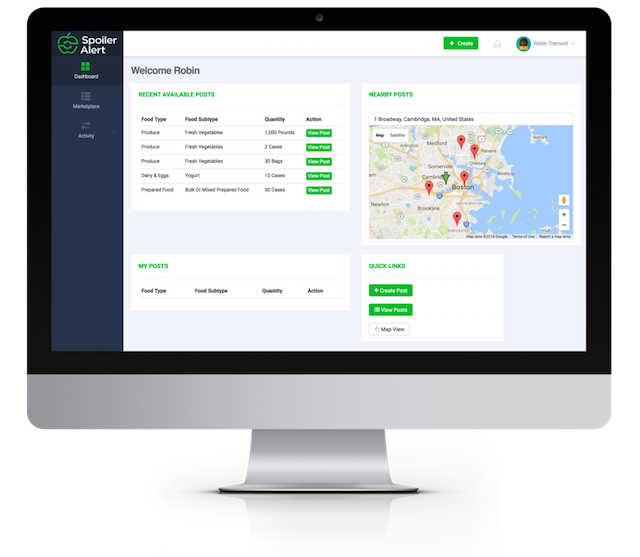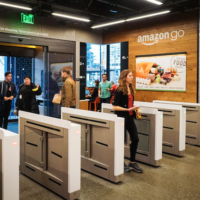
In tandem with the launch of the Food+Tech Job Board, we are thrilled to launch the Food Startup Growth Series. This series will give you an inside look at the strategies, challenges and best practices of fast-growing food startups.
In the United States, we spend $218 billion annually growing, processing, transporting, and disposing of food that is discarded. As awareness around the cost of food waste grows, the food industry is increasingly looking for creative solutions to reduce it. Boston-based Spoiler Alert is one of the startups working to help food businesses, farms and non-profits to minimize waste and recover value from surplus food. Through its platform, food businesses and farms can post, donate and sell surplus food and “ugly produce.” It also streamlines accounting systems, making it easier for companies to capture tax benefits and to track key metrics. When food becomes available, potential recipients are notified and interested parties are able to connect and coordinate costs and logistics.
While working towards an MBA at MIT, co-founder and CEO Ricky Ashenfelter met Emily Malina,who would become his co-founder and chief product officer. In 2015, they launched Spoiler Alert and were awarded a $50,000 non-dilutive grant from MassChallenge. They are also recipients of a $100,000 grant from the Rockefeller Foundation as part of the Unreasonable Institute’s Future Cities Accelerator. In March 2016, they raised a $100,000 convertible note from TechStars. Then, in November 2016, Spoiler Alert raised a $2.5 million Seed round of funding, led by Acre Venture partners with participation from Valley Oak Investments, LaunchCapital, Fresh Source Capital and FTW Ventures. The startup also recently partnered with major food producer, Sysco Corporation.
I spoke with Ricky about Spoiler Alert’s growth goals, how he’s proving company culture while scaling-up (they’re hiring!), and the unique initiatives that his team has created to assess personal growth within the company. He also told me how he plans on expanding his company’s services to other key markets in North America.
__________________
Danielle Gould: What are your growth goals for the next 12-24 months, and how do you plan to achieve those goals?
Ricky Ashenfelter: This is a great time to be in the “food waste innovation” industry, and we have a lot of work ahead of us to continue building a brand as a trusted resource in this field. We’re doubling down on our efforts to target leading wholesale distribution, food manufacturing and retail companies with our Enterprise offering, and we’re eager to take our Marketplace offering to other key geographies in North America. How are we going to do this? By continuing to work with great companies like Sysco Corporation, as well as by seeking input from leading nonprofits, food rescue organizations and government agencies that have a presence in those target communities.
DG: What does your team look like?
RA: Our team is loosely split across three functions: Product Development, Sales & Marketing, and Customer Success. Half technical, half non-technical – ranging from 20-something on the younger end to 50-something on the older end. We all work together in Boston’s Bay Back neighborhood in a great office decorated with lots of green, natural light, and our own company garden (the waste from which we try to keep to a minimum!).
DG: What does your company culture look like? How have you built your company culture?
RA: Culture is something we take incredibly seriously, and it’s built around 5 pillars that we’ve documented as a manifesto of sorts: Impact, Results, Transparency, Collaboration, and Personal Growth. These five are the results of principles (both realized and aspirational) that were important to the founders and enhanced with direct input from early team members. My personal favorite is Impact. Employees must – without question – be passionate about Spoiler Alert’s mission and/or how it materializes as a product. We have such a unique play within the food industry, and as an early stage company, it’s critical we see that embodied in each new wave of hires.
DG: How are you preserving your company culture as you scale up?
RA: We go to great lengths to make sure the new team members we bring on are screened for cultural fit through the interview process and embody it as they grow in our company. We’ve made it clear that every employee is responsible for the preservation and enhancement of our culture, not just the responsibility of leadership. One way we’ve done this is – quite literally – incorporating it into everyone’s performance reviews and feedback sessions. We only ask 3 questions when we evaluate performance: what are you doing well, where can you improve, and how have you enhanced the company’s brand and culture?
DG: What do you know now that you wish you would have known when you started scaling your company? What are the biggest challenges and lessons learned as you’ve grown your company?
RA: Our team has learned a lot about the values of personal growth, goal setting and feedback. Over the last couple of months, we’ve introduced four initiatives that “formalize” this: 1) setting and documenting actionable “OKRs” (Objectives & Key Results) with each team member; 2) offering informal performance reviews twice a year – focused on highlighting strengths, improvement areas, and culture contributions; 3) introducing monthly one-on-one sitdowns (or strolls through the Boston Public Garden) between each employee and a founder; and 4) soliciting anonymous, 360 degree feedback on leadership’s own performance and management style. This has resulted in what we believe to be a more motivated, higher performing team – from leadership on down.
DG: What’s keeping your team busy right now?
RA: At the end of the day we are a software company, which means a good portion of our employee base is engineers. What’s keeping them busy is enhancing our existing product and building out our future offerings. We’ve also grown headcount by 50 percent since the start of the year, making employee onboarding and ramp-up a really fun and critically important undertaking.
DG: What job(s) are you hiring for, and how will those positions help drive growth in your company?
CC: Marketing Manager. This person will play a significant role in developing content that is used to engage our target personas, designing sales collateral that supports business development efforts, and optimizing our website to drive top-of-funnel pipeline growth around the topics of sustainable food practices, supply chain management, and food waste awareness.
DG: What will someone who works for you be able to add to their resume?
RA: We’re looking for individuals eager to make a big splash with an early-stage company. We are an incredibly collaborative and transparent team, and anyone we bring on would be able (and expected) to get their hands dirty and play a role in directly tackling our biggest challenges. There is tremendous room for impact across all facets of our business – from launching a new product offering or closing a major partnership, to building our content’s readership and developing an authoritative industry voice.
DG: What kind of training do you offer for new employees who may be switching from other industries or who are just out of school?
RA: For each new employee, we have a structured, multi-day approach to onboarding which includes an overview of the company, our industry, and the different partners we work with. We’ve also launched a new immersive initiative whereby new hires spend time working directly with our nonprofit partners, either riding along during one of their food rescue operations or volunteering at their facilities. This is a great way to not only expose them to the work of food redistribution but also to give them a better sense of impact and targeted demographics.
DG: What’s your favorite interview question?
RA: My favorite question is “In a year or two’s time, whether you’re with our company or elsewhere, what do you want to feel you’ve accomplished in looking back upon this time? How does the Jane Doe of tomorrow look different than the Jane Doe of today?” I like this for two reasons: 1) it offers a glimpse at the individual’s level of ambition, and 2) it makes sure the individual is aligned with the company’s trajectory and strategy. This can be an easy mechanism for screening good candidates from great candidates, and ones that know what they’re getting into in joining a startup.
DG: Why do you think it’s exciting to be working in food right now?
RA: We think it’s a great time to be working in food. Data and technology are unlocking some incredible insights for an industry that historically has been slow to adopt change – particularly in the fields of operations, transparency, and supply chain. Growing consumer interests in where their food is coming from and how its producers’ are minimizing their environmental efforts are trends that are hopefully here to stay!





